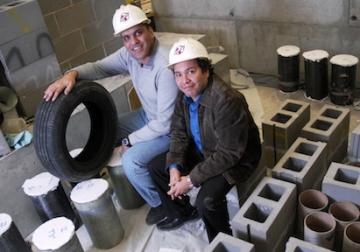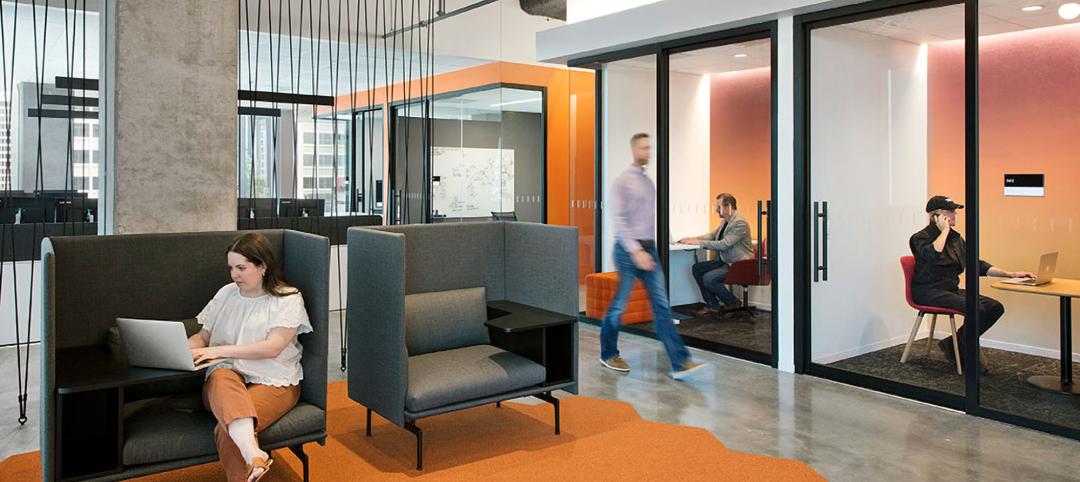Scrap tires could gain a new purpose as ingredients for construction materials, thanks to research at Missouri University of Science and Technology.
Discarded tires are a big problem. Landfills are teeming with them and they can harbor disease-carrying mosquitos and rodents. Stockpiles of old tires also burn easily — creating fires that can quickly get out of control and may burn for months or even years.
But the longevity and resilience of scrap tires also makes them ideal for other uses.
Dr. Mohamed A. El Gawady, a researcher at Missouri S&T, is currently testing new masonry blocks made with ground tires.
“Rubber has a lot of benefits in addition to its sustainability,” says El Gawady, associate professor of civil, architectural and environmental engineering. “It’s very durable and provides good insulation. Among their many potential benefits, these new blocks could cut heating bills by 50 percent.”
ElGawady has been working with Midwest Block and Brick, a Jefferson City, Mo.-based company, to create the blocks, which are made from sand and scrap tires ground to fine particles.
These rubber-added blocks, called rubberized blocks, were constructed with a variety of ratios of sand to rubber particles before coming up with the right balance.
“The rubber makes the blocks a bit weaker, so after testing various percentages, we now only replace about 20 percent of the sand with rubber, so the blocks retain their strength,” ElGawady says.
He and his students use a compression machine to test and compare the strength of prisms built with the rubberized blocks to conventional concrete masonry blocks.
Both rubberized and conventional blocks are being tested in an environmental chamber at Missouri S&T. In the chamber, the blocks undergo cycles of extreme temperatures and humidity levels, simulating different weather conditions. The rubberized blocks are also tested under cyclic compression loads simulating earthquake loads.
“Construction with these new blocks could improve a building’s resiliency during an earthquake by acting as shock absorbers,” says ElGawady.
Related Stories
Laboratories | May 24, 2024
The Department of Energy breaks ground on the Princeton Plasma Innovation Center
In Princeton, N.J., the U.S. Department of Energy’s Princeton Plasma Physics Laboratory (PPPL) has broken ground on the Princeton Plasma Innovation Center (PPIC), a state-of-the-art office and laboratory building. Designed and constructed by SmithGroup, the $109.7 million facility will provide space for research supporting PPPL’s expanded mission into microelectronics, quantum sensors and devices, and sustainability sciences.
MFPRO+ News | May 24, 2024
Austin, Texas, outlaws windowless bedrooms
Austin, Texas will no longer allow developers to build windowless bedrooms. For at least two decades, the city had permitted developers to build thousands of windowless bedrooms.
Resiliency | May 24, 2024
As temperatures underground rise, so do risks to commercial buildings
Heat created by underground structures is increasing the risk of damage to buildings, recent studies have found. Basements, train tunnels, sewers, and other underground systems are making the ground around them warmer, which causes soil, sand, clay and silt to shift, settle, contract, and expand.
Sports and Recreational Facilities | May 23, 2024
The Cincinnati Open will undergo a campus-wide renovation ahead of the expanded 2025 tournament
One of the longest-running tennis tournaments in the country, the Cincinnati Open will add a 2,000-seat stadium, new courts and player center, and more greenspace to create a park-like atmosphere.
Mass Timber | May 22, 2024
3 mass timber architecture innovations
As mass timber construction evolves from the first decade of projects, we're finding an increasing variety of mass timber solutions. Here are three primary examples.
MFPRO+ News | May 21, 2024
Massachusetts governor launches advocacy group to push for more housing
Massachusetts’ Gov. Maura Healey and Lt. Gov. Kim Driscoll have taken the unusual step of setting up a nonprofit to advocate for pro-housing efforts at the local level. One Commonwealth Inc., will work to provide political and financial support for local housing initiatives, a key pillar of the governor’s agenda.
Building Tech | May 21, 2024
In a world first, load-bearing concrete walls built with a 3D printer
A Germany-based construction engineering company says it has constructed the world’s first load-bearing concrete walls built with a 3D printer. Züblin built a new warehouse from a single 3D print for Strabag Baumaschinentechnik International in Stuttgart, Germany using a Putzmeister 3D printer.
MFPRO+ News | May 21, 2024
Baker Barrios Architects announces new leadership roles for multifamily, healthcare design
Baker Barrios Architects announced two new additions to its leadership: Chris Powers, RA, AIA, NCARB, EDAC, as Associate Principal and Director (Healthcare); and Mark Kluemper, AIA, NCARB, as Associate Principal and Technical Director (Multifamily).
MFPRO+ News | May 20, 2024
Florida condo market roiled by structural safety standards law
A Florida law enacted after the Surfside condo tower collapse is causing turmoil in the condominium market. The law, which requires buildings to meet certain structural safety standards, is forcing condo associations to assess hefty fees to make repairs on older properties. In some cases, the cost per unit runs into six figures.
Office Buildings | May 20, 2024
10 spaces that are no longer optional to create a great workplace
Amenities are no longer optional. The new role of the office is not only a place to get work done, but to provide a mix of work experiences for employees.

















